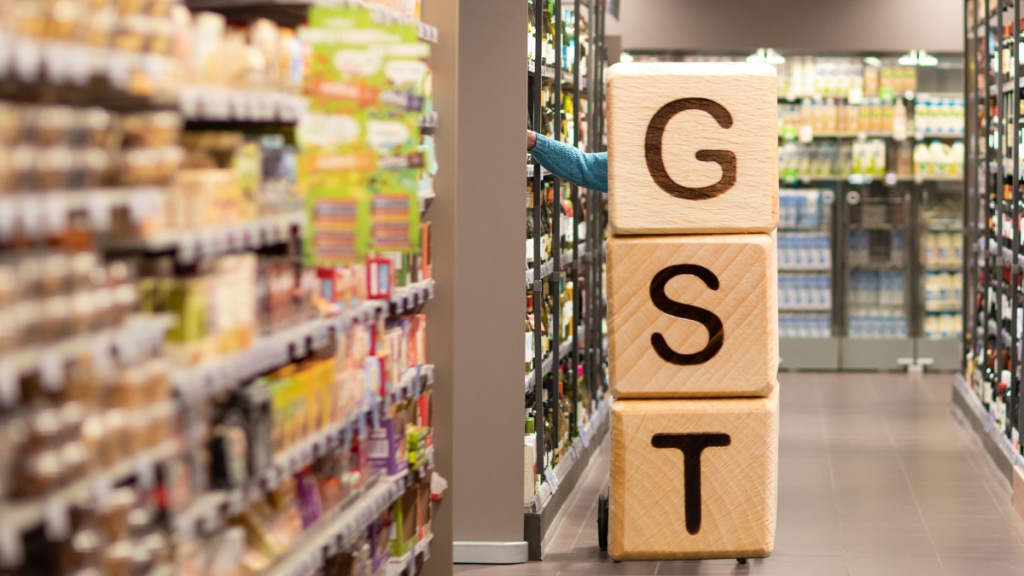From noodles and biscuits to ayurvedic products and frozen foods, many household essentials are expected to get cheaper if the government rolls out the GST reform announced by Prime Minister Narendra Modi on Independence Day. The plan is to scrap the 12 per cent and 28 per cent slabs and streamline the system into two main rates—5 per cent and 18 per cent.
Analysts expect that nearly 90 per cent of products, including key FMCG items, will move to the lower 5 per cent slab. The reform is likely to make everyday essentials more affordable, boost demand, and give organised players like Nestlé, ITC, Britannia, Dabur, and Hindustan Unilever a strong festive season lift.
Packaged food, home and personal care, and ayurveda products may gain
Jefferies highlights that the GST cut is expected to directly benefit packaged food, ayurveda, and personal care products. Condensed milk, dried fruits, frozen vegetables, pencils, and tooth powder—currently taxed at 12 per cent—may see the rate fall to 5 per cent.
Dabur and Emami, which manufacture ayurveda products, along with packaged food companies, are likely to benefit from cheaper processed foods and dairy items if the tax rate is reduced from 12 per cent to 5 per cent.
Jefferies noted that these changes come at a time when FMCG demand has been muted. A GST rate cut would provide relief to consumers and encourage higher spending. “A lower tax on these products can help improve demand at a time when the consumer sector has been facing a moderate growth trend,” the brokerage said in its report.
GST on biscuits, hair oils, and toothpaste may remain stable at 18 per cent
Jefferies also expressed optimism about biscuits, soaps, hair oils, and toothpaste, which may remain in the current 18 per cent GST slab. “Any potential decline will help home and personal care firms,” it noted in its report.
Tobacco and aerated beverages may move to higher GST slab
Tobacco, which currently attracts 28 per cent GST plus a cess that includes both specific and ad valorem duties, is expected to move to a 40 per cent slab. Jefferies said that “as long as the overall tax burden remains unchanged, this should be neutral for ITC.”
Aerated beverages, also currently taxed at 28 per cent GST plus a 12 per cent cess, are expected to move into the 40 per cent slab as they are considered sin goods. Jefferies noted that the impact on Varun Beverages is likely to remain neutral if the cess is absorbed into the higher slab without any incremental levy.
Snacks companies and popcorn makers poised to benefit from expected GST cut
Nomura expects snacks companies to be among the biggest beneficiaries, as nearly 80–90 per cent of their revenues currently fall under the 12 per cent GST slab, which may be reduced to 5 per cent.
Popcorn makers could also see gains, with the leading player earning around 55 per cent of revenues from popcorn, sauces, and ketchup—all currently taxed at 12 per cent.
Nestlé India, ITC, Britannia, and Dabur likely to benefit
According to Nomura, Nestlé India may benefit as close to one-third of its revenues come from noodles, pasta, and condensed milk. ITC could see a modest positive impact, with about 5–7 per cent of its sales generated from noodles and snacks. Britannia may gain from lower taxes on butter and cheese, while Dabur stands to benefit from its ethicals portfolio. Hindustan Unilever could see a smaller boost as sauces and mayonnaise account for less than 2 per cent of its sales.
For instance, about one-third of Nestlé’s revenues come from products like noodles, pasta, and condensed milk, which will attract lower GST. ITC and Britannia will gain from their dairy and packaged food portfolios. Dabur will see some benefit in its ethicals portfolio, while Hindustan Unilever stands to gain from categories like sauces and mayonnaise.
Possible GST reform to benefit stationery and paper products
Beyond food, the tax cut could aid stationery and paper products. ITC, which earns around 11 per cent of sales from notebooks, stationery, and paperboards, could benefit meaningfully. Footwear priced below Rs 1,000 may also become cheaper, providing relief to mass-market players. In eye care, lower taxes on lenses and frames could support the industry, though listed organised players derive only about 1 per cent of their overall sales from the segment.
Juices, jams, and sugar confectionery may become costlier
However, Nomura noted that not all FMCG categories will benefit equally. Some products currently taxed at 12 per cent, such as juices, fruit pulp bases, jams, and sugar confectionery, may move to the 18 per cent slab. This could make these items more expensive and weigh on sales. Analysts warn that Dabur, which derives around 15 per cent of its sales from juices, may face some pressure, though the impact on ITC and HUL will be minimal as juices form a small part of their overall sales.
Festive season timing crucial
Industry experts say the timing of the reforms will be key.”The festive season shopping will start from mid Sep. The implementation of GST rate changes on consumer durables needs to be timed accordingly, or there is a risk of delay,” Jefferies noted.
